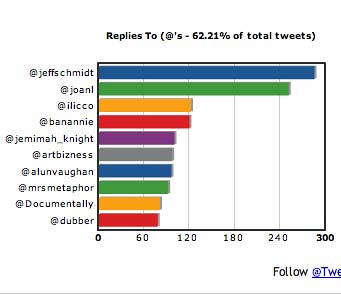 One of the common mistakes made by people considering the ‘usefulness’ of social media is that value measurements are somehow detached from any acknowledgement of just how much of what human beings do is really screwed up.
One of the common mistakes made by people considering the ‘usefulness’ of social media is that value measurements are somehow detached from any acknowledgement of just how much of what human beings do is really screwed up.
What does that mean?
When critics of Twitter, or blogging, or anything else online, pick on group behaviours as evidence that a service is flawed from the get-go, they seem to apply a completely different set of value measurements than they do to their control group – be that ‘conversation’ or ‘newspapers’ or whatever.
As an example, let’s go back to Oliver James and his statement that “Twittering stems from a lack of identity. It’s a constant update of who you are, what you are, where you are. Nobody would Twitter if they had a strong sense of identity.â€
Now, apart from the misunderstanding about what’s actually going on on Twitter, even if whatever nonsense he’s read on Twitter that made him think that IS what people are doing on there, it’s what those people are doing the rest of the time anyway! All Twitter does is it removes proximity as a factor governing ‘conversation’. It is, quite literally, ‘just chatting’.
And it works almost exactly like conversation in a pub, minus beer and body language:
- People say things
- Interesting people get a response and become the focus of the conversation for a while.
- The longer you stick around, the more likely you are to dig a little deeper and find the people who say great things but in a quieter voice.
- If you understand the nature of the medium, sensitive people can pick up on those who need help, encouragement and maybe even a phone call or email to help them out.
An arrogant self-obsessed narcissist isn’t going to stop being one just because they get a Twitter account, though they may finally have a statistical representation of just how little their desire to be listened to is reflected in other people’s desire to listen.
Likewise, caring, sharing, friendly, open, generous people aren’t going to suddenly become boorish, self-promoting morons just because that’s how horrible people behave on Twitter.
Anyone who tells you that technology changes anything fundamental about human nature is lying. It presents different ways to manifest both our basest instincts and our greatest altruistic potential. And in the middle, it means that conversations can be had across continents, thoughts and ideas can be shared, swapped and discussed by people from wildly different backgrounds and perspectives, and a greater degree of understanding fostered by those who open themselves up to the possibilities.
Social media doesn’t make narcissists of non-narcissists. It also doesn’t ‘fix’ personality disorders. It does give people a way of conversing openly, and it gives businesses a great way to open an informal window on their process and practices. The kind of thing that used to happen by ‘talking to your customers’ can now happen to clients, customers and interested parties around the world, and can also be eaves-dropped, searched, archived and passed around.
Archiveable conversations are a tremendous social tool, a great business asset, a wonderful creative learning opportunity and have the potential to greatly enhance the amount of information we have at our finger tips.
But we HAVE to remember that potential isn’t action, information isn’t wisdom and technology isn’t the panacea.
Social media is a conduit for information and an environment of potential for enhanced conversation, skill sharing, media discovery and ‘brand reconfiguring’. It can be used to crowd-source opinion, share recommendations and hold businesses to account via the group-response capability.
It can also be used to rant, to abuse, to bore, to indulge narcissism, to whinge, insult, plagarise, etc. etc. But those things weren’t invented by the internet, and won’t die if people stop using Twitter.
So, when academics like Dr David Lewis, a cognitive neuropsychologist and director of research based at the University of Sussex, says in The Times “We are the most narcissistic age ever. Using Twitter suggests a level of insecurity whereby, unless people recognise you, you cease to exist. It may stave off insecurity in the short term, but it won’t cure it.â€
…I have to wonder what kind of Twitter usage he’s talking about, whether the Twitter users he’s studying are terminally insecure in the first place, and whether he bothered investigating altruistic, “useful” Twitter usage at all?
My guess is ‘probably not’. I’m open to being proved wrong, so I’d love to know what kind of research David Lewis and Oliver James did before coming up with their pronouncements.
C’mon, enough with the luddite observations and unrealistic expectations of how people’s behaviour will change. Let’s see the potential, harness it, and allow people to get excited about the kind of community action and knowledge exchange it fosters, while ignoring those who – as they do in every area of human endeavour – seek to exploit it lazily purely for their own ego-gratifying ends.
Our experience is that the relationships that Lobelia and I have formed via social media platforms over the last year have lead to us talking to, learning from and swapping ideas with some of the smartest, wisest, most interesting, funny and helpful people we’ve ever come across. And we booked a tour through it.
The picture at the top of this post is from tweetstats, and shows the top 10 people I’ve sent @ replies to. All of them are fabulous interesting people. Musicians, journalists, geeks, thinkers… and my mum. 🙂
Now, tell me again what’s wrong with Twitter?
